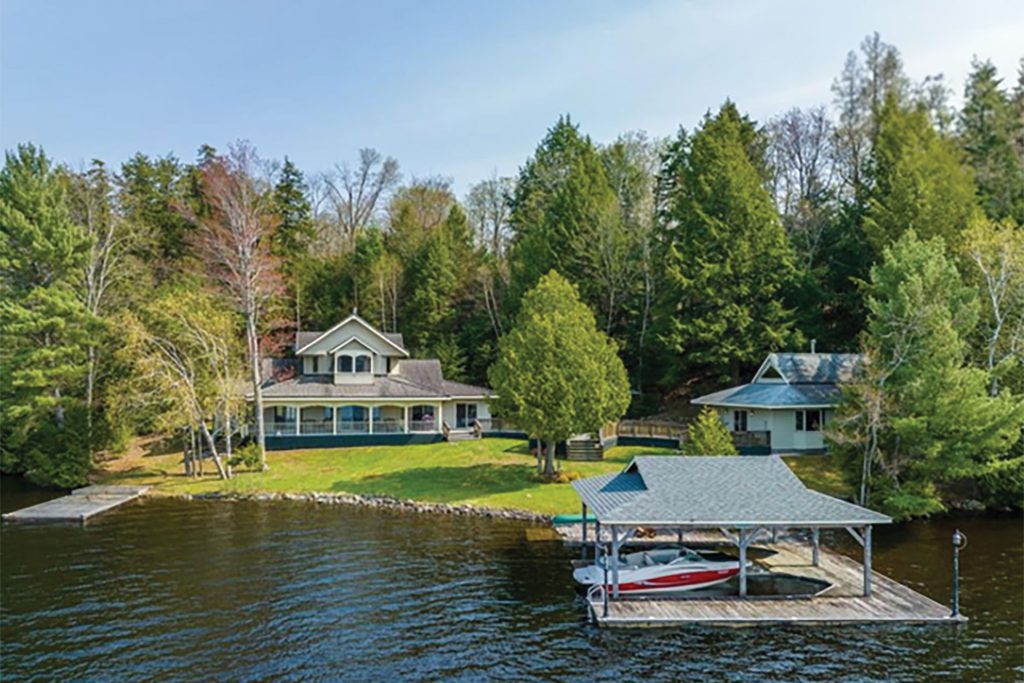The word ‘cottage’ conjures up all manners of feelings and memories, but for Kelly Fallis the thoughts immediately go to leaving her vehicle and getting in a boat.
Kelly has been cottaging on an island since 1992, when her family purchased a new summer residence.
“I vividly recall that first boat ride across to our new island cottage, and subsequently the ride back to the marina loaded with garbage bags of the past owner’s clothes!” says Kelly, a sales representative with Chestnut Park Real Estate Limited.
As a long-time Lake Muskoka islander, Kelly keeps a close eye on island activity. With prices skyrocketing on the mainland due to the sheer lack of inventory, coupled with restrictive bylaws regarding new development, the ratio of sales of island to mainland properties has remained the same in the last five years.
“At the end of 2022, I tallied the numbers, and it was the exact same split – mainland to island, 80-20 – that it had been the past five years running,” she says. “Island cottages have equally appreciated in value alongside mainland but have always – and will always – trade at a discount to the mainland.”
Land value on islands is currently trading approximately 65 percent less than the mainland. So, it’s mystifying why there isn’t more movement in that market segment.
“Why, when more and more buyers are ‘priced out’ of mainland property, do they not consider islands?” Kelly asks. “The answer is likely that they don’t understand what it means to be on an island. Two-thirds will say ‘no’ to islands from the jump. That’s totally fine, but for the ones that are open to the concept, it’s a wild ride – in so many ways!”
Learning the skills
For those who immediately wave away any ideas of island life, the objections are common. It starts with being comfortable with boating skills and navigating the waterways. But, as Kelly notes, the more you do it, the more confident you’ll become.
“Several marinas offer ladies and kids boat driving clinics now, so no need to be stressed out, performing under pressure,” says Kelly. “Learn from the pros while no doubt making new ‘equally bad’ boating lake friends; find your people, get some skills and have a good laugh doing it – isn’t that what cottage life is all about?”
The second factor many have concerns about is the weather: what do you do when you get to the marina and it’s raining?
“There are now all sorts of boats that make for good islander haulers,” she says. “Most people have one practical boat for the back-and-forth marina runs and ‘the other boats’ for recreation.”
Then there is what Kelly likes to call “the triple lug.” Unload the car into the boat, boat to the dock, then dock into the cottage. Likewise, every boat that leaves the island usually has garbage with it.
“Islanders are constantly transporting stuff back and forth but once you’ve arrived, you have arrived – and this is what most mainlanders don’t understand,” she says.
Understanding the details
There are more people aging out of islands than mainland, as there comes a time in life when it’s simply too much. This presents an inventory opportunity. But Kelly says those considering buying on an island should consider a few important items.
Building and renovations will cost about 25 percent more than on the mainland, and tradespeople are very localized. Look for ones that have their own boat.
Also, those looking to buy an island property should note that lenders will not loan as much for a three-season residence on an island. Typically, it’s 50 percent loan-to-value with a maximum of 65 percent.
As well, it’s essential to know that every island is different, and their topography changes wildly. Even on the same island you can have two flat lots with no stairs and one steep lot in the middle with 100 stairs to the water.
Marina access and mainland docking should be secured when buying, as marina docking isn’t guaranteed, even if the last owner had an agreement in place.
“It’s not legally transferrable in a deal as the decision lies with the marina owner, not the user,” explains Kelly.
There is a lot to love about island life. From the wonderful nature to the amazing community of islanders, it certainly has its benefits.
“On islands, the dogs and kids run freely; many islands have trails – either formal or trampled – to stretch your legs or actively exercise,” she says.
Those wanting to learn more about island life or find out what their island property is worth can reach out to Kelly, an islander through and through.
See the full article on Dockside


